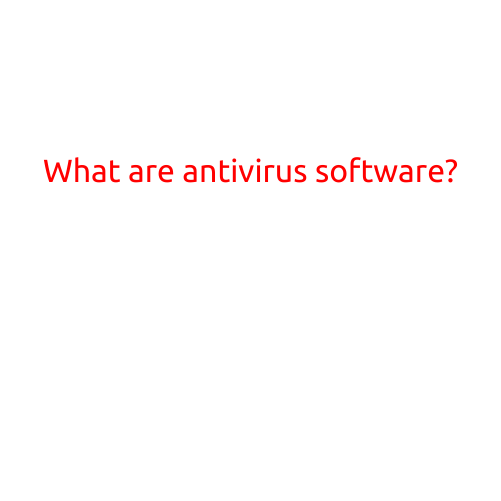
What are Antivirus Software?
In today’s digital age, computer viruses and malware have become a major concern for individuals and organizations alike. With the rapid growth of the internet and the increasing reliance on digital technology, the threat of cyber attacks has never been more real. To combat this, antivirus software has emerged as a crucial tool in the fight against malicious software threats. But what exactly are antivirus software, and how do they work?
What are Antivirus Software?
Antivirus software, also known as anti-malware software, is a type of computer program designed to detect, prevent, and remove malicious software (malware) from a computer or network. Malware refers to any type of software that is intended to harm or exploit a computer or its users. This includes viruses, Trojans, worms, spyware, adware, and ransomware, among others.
Antivirus software uses various techniques to identify and block malware, including:
- Signature-based detection: This method involves comparing the code of suspected malware with a database of known malware signatures. If a match is found, the software detects and removes the malware.
- Behavioral analysis: This method involves monitoring the behavior of a program to determine if it exhibits characteristics of malware, such as attempting to connect to unauthorized servers or modifying system files.
- Heuristics-based detection: This method involves analyzing the characteristics of a program to determine if it has potential malicious properties, such as encrypting files without a valid reason.
How Do Antivirus Software Work?
Antivirus software works by:
- Scanning the system: The software scans the computer’s hard drive, memory, and network connections for signs of malware.
- Identifying malware: The software identifies potential malware based on its characteristics, behavior, or code.
- Removing malware: The software removes or quarantines the identified malware to prevent it from causing harm.
- Updating signatures: The software regularly updates its malware signature database to ensure detection of new and emerging malware threats.
Types of Antivirus Software
There are several types of antivirus software available, including:
- Endpoint protection: This type of software protects individual devices, such as laptops and desktops.
- Network protection: This type of software protects entire networks, including servers, routers, and firewalls.
- Cloud-based protection: This type of software stores malware signatures and analysis in the cloud, providing fast and efficient detection.
Why Do You Need Antivirus Software?
In today’s digital world, antivirus software is essential for protecting your computer, network, and data from malware threats. Here are some reasons why:
- Prevents data loss: Antivirus software protects your data from being stolen, deleted, or encrypted by malware.
- Prevents system crashes: Malware can cause system crashes, freezes, and slow performance, which antivirus software can prevent.
- Protects online transactions: Antivirus software protects your online transactions, such as online banking and shopping, from being intercepted or hacked.
- Provides real-time protection: Antivirus software provides real-time protection against malware threats, ensuring your system is always safe and secure.
Conclusion
Antivirus software is a vital tool in the fight against malware threats, providing real-time protection, detection, and removal of malicious software. By understanding what antivirus software is and how it works, you can make informed decisions about protecting your computer and data from the ever-evolving threats of the digital world.





